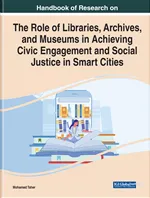New book: Handbook of Research on the Role of Libraries, Archives, and Museums, IGI-Global., c 2022). Edited by Mohamed Taher
Precursors for inclusive, accessible, engaging, equitable, and emphatic information management and services:
- LAM are for use.
- LAM empower the citizen.
- LAM are in the life of the citizen
- LAM save the time of the citizen.
- LAM are living organism - (Adapted from Dr. S R Ranganathan's five laws. Taher, 2022. in Taher, M. (Ed.). (2022). Handbook of Research on the Role of Libraries, Archives, and Museums in Achieving Civic Engagement and Social Justice in Smart Cities. IGI Global. p. xlviii).
⭐Taher, M. (Ed.). (2022). Handbook of Research on the Role of Libraries, Archives, and Museums in Achieving Civic Engagement and Social Justice in Smart Cities. IGI Global.
Book Launch Recording uploaded on youtube.🌟

Share Exclusive 50% Promotional Discount on this book (Handbook of Research on the Role of Libraries, Archives, and Museums in Achieving Civic Engagement and Social Justice in Smart Cities]. Simply utilize the coupon code IGI50 during the checkout process to take advantage of this offer. Note: This discount can only be used when ordering directly through IGI Global.
>>>> Here is a link to the introduction, preface and Contents
PRAISE & RECOMMENDATIOS FOR THE BOOK
- Vanda Vitali, Ph.D. Vice president, Culture and Development International Initiatives. The volume is a valuable source of cutting-edge, tools and interventions.
- Ravindra N. Sharma, Ph.D. Dean of Library (Retired) Monmouth University, USA. Rich and very impressive collection.
- The Rev. Prof. Dr. James Christie, Ambassador-at-Large, Canadian Multifaith Federation, Co-editor, Religious Soft Diplomacy and the United Nations. Lexington, NY. The work is global, comprehensive and cross-cutting.
- Dr. S. L. Sangam Former UGC Emeritus Fellow, Professor and Head, Dean Faculty of Social sciences, Karnatak University, India. This text will serve as a thorough reference on its main topics for researchers, LIS professionals and students.
FOREWORD: Nancy Kranich, Past President, American Library Association
This book shines a bright light on evolving trends where libraries, archives and museums have come to the forefront and stepped forward to claim an indispensable role ensuring more equitable and engaged smart cities. LAMs are building on their long history of civic engagement and social justice including facilitating community conversations, uncovering community aspirations and concerns, partnering to advance shared goals, teaching civic and digital literacy, bridging digital and literacy gaps, and preserving the extraordinary historic and cultural experiences of ordinary people.
Thanks to 36 authors from six continents; 60 peer-reviewers' team, five editorial board members, and support from across many sectors, this book is a great resource.
- This is the first book to explore all three cultural heritage institution’s – LAM’s engaging and inclusive approaches
- Revitalizes the need for speed in Digital Literacy, using an IDEA lenses (Based on digital exclusion during COVID-19)
- Post-COVID-19 Preparedness Survey Results
- Renews LAM’s Faith in social and civic responsibility
- Presents the potential power of Collaboration in Smart Cites
- Recommends integrated approach in Teaching Literacy for SJ & CE
- Confront Extremism via Literacy Program
- Conservation Practice in Indonesia
- Diaspora Organization in Toronto, Canada
- Extending Shiyali Ramamrita Ranganathan in the 21st Century
- Gurudas Mahavidyalaya, Kolkata India
- Salar Jung Museum Library, Hyderabad, India
- Smart City Technology and Civic Engagement in Ontario, Canada
- Tribals of Kerala, India
- Countering Fake News, India
- Digital Literacy Niche in Academia, India
- Rural Library Service, Indonesia
- Social Justice as it Evolves
- Are There Inclusive, Accessible Reference Tools for the Post-Pandemic Era?
- Building Civic Engagement in Smart Cities
- Digitization of the Cultural Heritage
- Human Rights Literacy
- Smart Cities & Public Libraries in India
- Whole Person Approach
- Digital Literacy Training
- Designing an Education Curriculum Through Collaboration, Africa
- Metaliteracy in the Smart Cities
- Model-like LIS-educational Implementations in Hungary
- Resources to Teach Social Justice
- Do LAM’s collaborate (national or sectoral level) in providing CE or SJ in literacy programs?
- LAM & Community organizations have any national or sectoral relationship in providing literacy? If yes, what works well?
- Academia ignores digital literacy. Then who is preparing the professionals for the smart cities it?
- Most LAM’s graduate programs do not include literacy relating to CE, SJ. Then, who is doing it and who is partnering in it?
- LAM’s faith in its social and civic responsibility was well discussed in theory, why is it absent in practice?
- LAM are for use: Information and Access is also for the marginalized and have-nots in a Smart Just Society. (Campbell & Smith, 2017; Oakley & Naylor, 2005).
- Every LAM user’s Literacy: skills via inclusive metatags, by social empathy, and by diligent conservation/conversation process. (Subramaniam & Jaeger, 2010).
- Every citizen’s empowerment: Outreach and reach-out to engage (the non-user and empower) where the non-user lives. (Fernández-Ardèvol et al., 2018).
- Time-Sharing is Time Saving: Everyday life skills also for the common people (with due concern for accessibility, findability, searchability, discoverability, and usability) must be developed by LAM. (OMC Working Group, 2014).
- LAM’s Information Service is a Living Organism - 24 X 7 - ubiquitous, virtual and synchronous connection that is physically and reliably sound. (InterPARES Trust Project Research Report)



0 Comments:
Post a Comment
<< Home